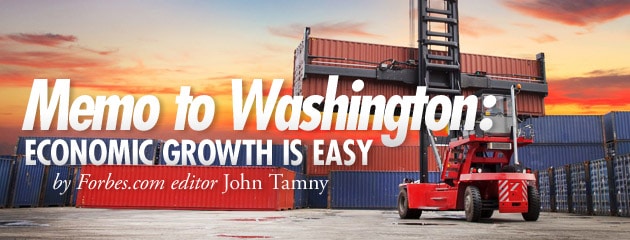
Editor’s note: Forbes.com editor John Tamny, author of the below opinion editorial which first appeared at Forbes.com, will be speaking at Grove City College on Sept. 24 on the subject “How Government is Hurting the Job Market for College Graduates.”
With the U.S. economy continuing to limp along, the economics profession continues to cast about for answers to this seeming mystery. In truth, economic growth is easy, and the irony today is that economists themselves are arguably the greatest barrier to a rebound.
Most would argue that the U.S. economy presently lacks aggregate demand, so the answer is for our federal government to spend with abandon in order to perk up that which is lifeless. The thinking here is backwards.
John Stuart Mill long ago observed that we trade “products for products”, so if the desire is for increased consumption, we must stimulate the supply side of the economy. Specifically, we must remove the tax, regulatory, trade, and monetary barriers to productivity. For individuals to consume, they must produce first.
Considering taxes, they’re nothing more than a price we place on productivity. For the software developer whose innovations will enhance business efficiency, or the scientist who will work enormous hours to find a cure for cancer, income tax rates are the price we charge for their efforts. In that case, the goal should be to lower the price of work as much as possible in order to stimulate as much economic effort as possible. By virtue of their success entrepreneurs greatly improve our lives, and because they do, the fact that top earners are relieved of 35 percent of their income should strike us as grotesque.
Capital gains taxes are a price placed on investment, and here it should be remembered that there are no companies and no jobs without investment first, so why not a zero rate of taxation on capital gains?
Moving to regulations, businesses are in business to achieve profits, yet regulations inhibit the path for so much effort and money extended spent to remain in compliance. Regulations rarely work (figure the struggling U.S. banking sector remains one of the most regulated on earth), but they always succeed in distracting businesses that should be focused on the bottom line.
Regarding trade, the latter is the reason we go to work each day. We trade the fruits of our labor for the food, clothing and cars we don’t produce, so tariffs are tautologically a tax placed on our work. Worse, tariffs are usually implemented to prop up ailing businesses, and as they’re often met with retaliation, our most successful businesses pay the biggest price for them in the form of shrunken foreign markets.
As for money, it can’t be stressed enough that the dollar is the most important price in the world. Functionally the world’s currency, the dollar is serves as the measure meant to facilitate exchange among the world’s producers. Of course when the dollar is weak and unstable, a disharmony reveals itself among the productive that frequently retards what should be the peaceful flow of goods.
More problematic, it can’t be forgotten that there are no entrepreneurs and job-creating companies without investment first. Reduced to the basics, when investors commit capital to new ideas they are buying future dollar income streams. But if policy favors a weak dollar, investors have greatly reduced incentives to back new ventures given an understandable aversion to future returns that will come back in devalued dollars.
Excitingly for those lucky enough to be American, we live in the most talented country in the world. The term “American exceptionalism” is frequently misused, but the simple truth is that our country’s exceptionalism is a function of the U.S. having historically been the place where the world’s ambitious migrated given a desire to live and work under a government whose sole purpose was to protect their freedom to pursue their dreams.
At the moment we still have the talent, but the price of work and investment is set to rise in 2013, the regulatory state continues to expand as evidenced by Obamacare and Dodd-Frank, China-bashing is in vogue in both political parties, and the dollar’s continued fall has scared away intrepid investors. The good news is that these policy errors can be reversed, and if so, we’ll see once again just how easy is economic growth.

